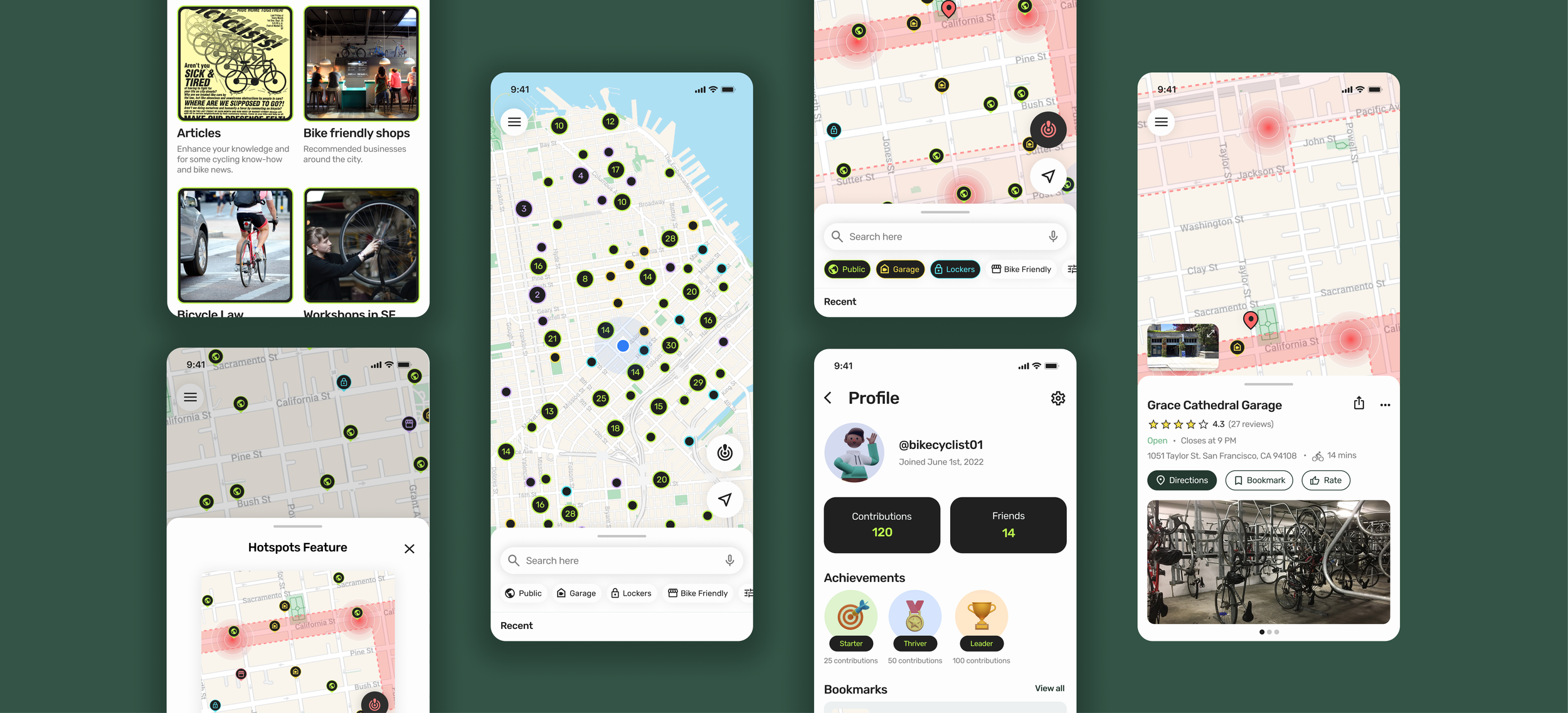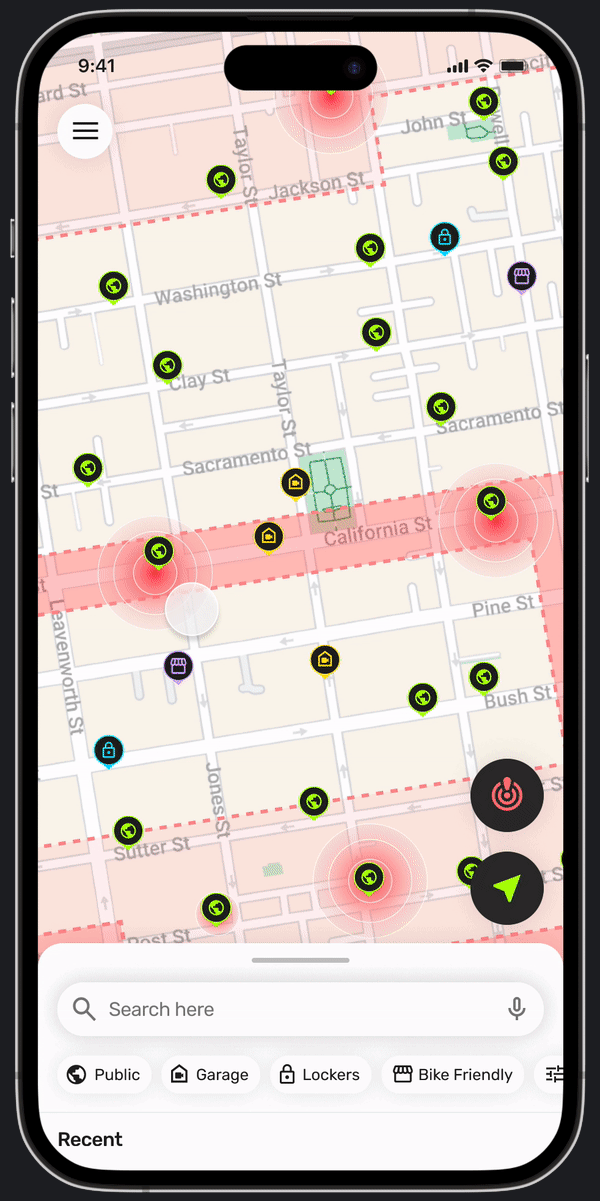Velos
A mobile app to help cyclists find safe and secure bike parking options

BACKGROUND
As an avid cyclist, I believe that cycling is one of the most efficient, cost-effective, healthy, and environmentally friendly ways to travel in any city. But as many cyclists know, keeping your bike safe in a big city can be challenging and requires constant alertness and a good amount of luck to avoid bike theft. I had my bike stolen two months shortly after moving up north to San Francisco and it was a pretty awful experience. I had my bike locked outside of a cafe while studying with a friend and by the time I went back, it wasn’t there—gone. I eventually got a new one, but this experience helped me realize there’s a real need for a tool to help cyclists avoid bike theft and find secure parking options.
TIMELINE
2 Months (2022)
MY ROLE
Product Designer
(UX/UI)
TOOLS
Figma/FigJam, Photoshop
TASKS
User Research, Ideation, UI Design, Prototyping, Usability Testing, Branding
THE PROBLEM
In the United States, a bike is stolen every 30 seconds, equaling roughly 2,000 bikes stolen every day.
With well over a million bikes stolen every year in the US. and a rising demand in the stolen-bicycle market, security is by far one of the most important and pressing issues for cyclists today. Despite cities’ recent efforts in improving the cycling experience such as better bike infrastructure—finding safe and secure bike parking remains a major challenge for most cyclists across the US and a topic under-discussed.
Images of bike theft around San Francisco
How might we provide a seamless experience for cyclists looking for safe parking options?
THE SOLUTION
A mobile app that helps cyclists find nearby parking options, discover safer alternatives to street parking and identify areas where chances of bike theft are higher.
View Full Prototype →
Onboarding + Quick Tour
A smooth and interactive user experience for new users.
Users will receive guidance on best practices for properly locking their bikes to minimize the chances of theft and be greeted with a quick tour of the app shortly after to introduce them to the different features of the app.
Find safe and secure bike parking at your fingertips
Discover all available bike parking options in your area—including safer alternatives to street parking—and easily filter through them to plan your rides with ease. No more guessing, scanning, calling local businesses or endlessly researching online for recommendations.
Avoid high-risk areas for bike theft
Helping users stay informed about recent bike thefts and high-risk areas in their city, enabling them to make smarter choices when it comes to securing their bikes.
Rate + Review
Users' comments and reviews on locations offer valuable insights to other cyclists for informed parking decisions, including area safety, street foot traffic, security, and bike theft incidents.
RESEARCH
Secondary Research
During this research, I explored many open data sources that could provide insights on bike parking locations and bike theft data like local government websites and bike advocacy groups, as well as analyzed discussions and forums like Twitter and Reddit to get unfiltered experiences from cyclists.
I identified that many people’s decision to own a bike or commute by it is strongly affected by the security concerns over their property. Additionally, there is a lack of tools available to assist cyclists in finding safe and secure bike parking. Google and Apple Maps currently do not have any data for public street bike racks and provide very limited information on bike parking facilities.
Reddit posts from users posting about their experience and asking for bike parking recommendations
Speaking with Users
I conducted 5 user interviews to help me get a better understanding of the steps users take to protect themselves from bike theft and identify specific challenges cyclists face when it comes to finding bike parking.
Cyclists currently often resort to tedious ways of finding safe bike parking options, such as manually scanning for bike racks or asking local businesses if they allow bikes to be parked on their property. They also spend time researching online for information about bike parking facilities or rely on word-of-mouth recommendations from other cyclists. These methods are time-consuming and unreliable, making it difficult for cyclists to feel confident and secure in leaving their bikes unattended.
“I always hear people say “don’t ever leave your bike locked in public”, but I don’t think it’s as black or white. It depends entirely on the street you’re planning to lock it on”
— Participant 2
“When going to a new place on bike, I usually use street view and scan on the maps app, but that can be very tedious.”
— Participant 5
Design Challenges
How might we design an intuitive interface that allows users to easily filter and search for safe and secure bike parking options?
How might we help cyclists make informed decisions about where to safely park their bikes in public spaces?
How might we make it easier for cyclists to assess the safety of different neighborhoods/streets for bike parking?
IDEATION
Opportunities and Direction
Taking what I’ve learned from my research, I started brainstorming ideas and looking for opportunities around the insights I’ve gathered. After ideating a long list of possible features and in the interest of time constraints, I decided to narrow my focus on the following 4 features that have the potential to make the biggest impact on users.
Bike parking location database: Interactive map that displays all bike parking locations, including both free public spots and privately paid options
Overlay feature indicating the areas of high-risk areas for bike theft
User Ratings and Reviews to help cyclists make more informed decisions about where to park their bikes
User Flows
I created user flows illustrating how users would navigate the different features of the app. The user flow below demonstrates how a user would find a safe and secure parking option near their desired destination.
User flow: User wants to find a safe and secure bike parking location near their destination
DESIGN
Design Iterations
After establishing the app's core features and user flows, I started designing by exploring how each of these features could be integrated with one another through sketching on paper and then moved on to low and mid-fidelity wireframes. The design of the app went through multiple iterations and had some usability testing along the way to validate some of the ideas and identify potential usability issues or areas for improvement. I then continued iterating upon ideas, increasing the fidelity, and looking for ways to further streamline the process for users.
Early Sketches
Low-Fidelity Key Screens
Mid Iteration Key Screens
Near Final Key Screens
Mid-Fidelity Design Revisions
The Search bar was moved to the bottom of the screen for improved accessibility
Color-coding to indicate the level of risk was changed to the usage of a single color (red) and varying in intensity
Hotspot button went through various stages in color, eventually ending with red as it was found to be most intuitive with users
The bike theft reporting button was eliminated from the default map due to user confusion and a perceived lack of priority for it
Interactive Map Exploration 📍
The interactive map is a valuable resource for cyclists looking to find bike parking options, plan their bike routes, and get further information on bike parking facilities.
I prioritized simplicity and intuitiveness when designing the maps, ensuring that the information presented was easy to read and accessible. I did this by:
Strategically using color coordination and icon patterns to represent the different types of parking options
Usage of high contrast colors to make the map easier to read for users with visual impairment
Including filters to make it easy for users to narrow their searches and quickly find something that fits their specific needs
Avoiding clutter; not featuring too many buttons on the default map and tucking away extra features into the hamburger menu
Hotspot Feature Exploration
When designing the Hotspot feature, my main focus was to present data on high bike theft areas in a user-friendly manner. Initially, I opted for color coding to indicate the level of risk (e.g., green for low risk, red for high risk, etc). However, I eventually switched to using a single color (red) and varying its intensity to enhance accessibility for color-blind users and make the feature more intuitive.
UI KIT
Visual Design and Branding
When building the brand and design system for the Velos app, I knew I wanted something that felt vibrant and modern to appeal to the younger and physically active audience that would be using the app. Embracing the colorful language of the brand, I chose neon colors to color-coordinate the different forms of parking options available and used those pop of colors throughout the design.
View Full UI Kit →
FINAL DESIGN
All Coming Along Together 🚴♂️
Finding safe and secure bike parking has never been so easy or straightforward. The Velos app provides a digital solution for cyclists to find nearby bike parking options, explore safer alternatives to regular street parking, and a powerful feature for assessing the risk of bike theft in specific areas or neighborhoods. Additionally, it’ll equip users with handy resources for minimizing the chances of bike theft, requesting new bike racks from the city, and discovering bike-friendly businesses around the area.
View Full Prototype →
Demo of the app for a user looking for safe and secure parking options near Huntington Park, San Francisco
CONCLUSION
What I’ve Learned
Working on this project taught me the importance of trusting the process and getting feedback from users early and often. The conversations I’ve had with fellow cyclists were extremely helpful as they were able to show me different perspectives and solutions to the same problem. I also learned that choosing the right fidelity to work with during the design process helps in saving time.
Future Goals
Get this product into the hands of more users for further validation and continue refining the app.
Explore a community engagement feature that would allow users to connect with other cyclists and share tips and recommendations.











